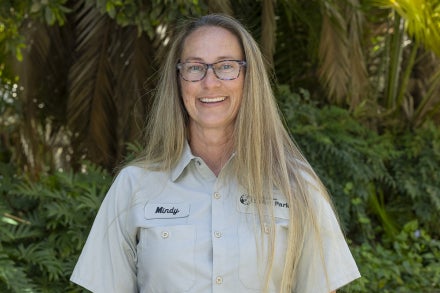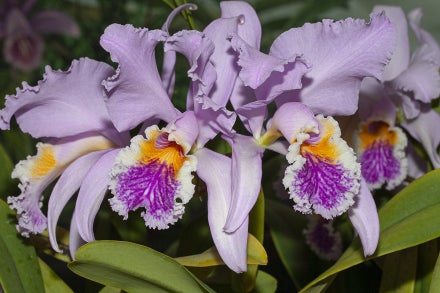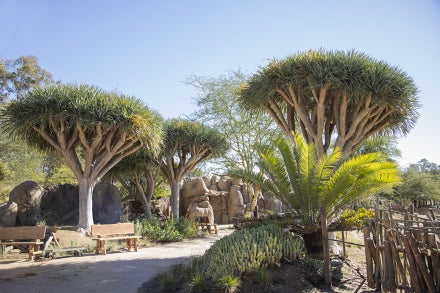CONTACT:
San Diego Zoo Wildlife Alliance
Public Relations
619-685-3291
publicrelations@sdzwa.org
sdzwa.org
UC Davis News and Media Relations
Kat Kerlin
530-750-9195
kekerlin@ucdavis.edu
California Department of Fish and Wildlife
Jordan Traverso
916-212-7352
jordan.traverso@wildlife.ca.gov
NEWS RELEASE
Three Orphaned Mountain Lion Cubs Rescued in San Diego
The Young Lions Will be Cared for at the San Diego Zoo Safari Park
SAN DIEGO (Dec. 13, 2023) – San Diego Zoo Wildlife Alliance, the University of California, Davis (UC Davis) Karen C. Drayer Wildlife Health Center, and the California Department of Fish and Wildlife recently rescued three orphaned mountain lion cubs. The cubs—approximately 6 weeks old at the time of their rescue—were each found separately following an extensive search over the span of a week. Each cub was treated in the field for dehydration before being taken to Paul Harter Veterinary Medical Center at the San Diego Zoo Safari Park. Because the young lions were orphaned at an early age, they cannot be safely reintroduced into their native habitat. The California Department of Fish and Wildlife designated the San Diego Zoo Safari Park as a safe haven for the rescued cubs, offering them a second chance and lifelong care.
“Mountain lions are a keystone species right here in our own backyard” said Lisa Peterson, executive director, San Diego Zoo Safari Park. “It’s been a privilege to nurse these youngsters back to full health, and we now have the honor of caring for them long term. While our research teams and our conservation partners continue their mountain lion work in the field, the Safari Park will be a refuge for these three cubs offering them native landscapes and new opportunities to thrive, while sharing the importance of coexistence among wildlife with our guests.”
A search party consisting of San Diego Zoo Wildlife Alliance, UC Davis Wildlife Health Center, and the California Department of Fish and Wildlife assembled to find the cubs. They leveraged data from the GPS collar of the mother, designated F307 by the UC Davis mountain lion research team, to determine the search area. On the first day of the search, team members from UC Davis found the first cub hiding in a hole, and the second was wedged tightly between two rocks. Three days later, they found the third cub crouching in chaparral. The search continued for several more days and remote trail cameras found no evidence of other cubs. All three cubs were within 250 feet of each other. Due to their young age, they likely would not have survived more than one week on their own. The trio were reunited at the Paul Harter Veterinary Medical Center and nursed back to full health.
“Our UC Davis mountain lion study team really appreciated the help from the San Diego Zoo Wildlife Alliance and the Department of Fish and Wildlife in the effort to locate the cubs, and the willingness of the San Diego Zoo Safari Park to give them excellent care long term,” said Dr. Winston Vickers, director, Southern California Mountain Lion Program, Karen C. Drayer Wildlife Health Center. “As veterinarians, we use education and research to help people living in mountain lion habitat to protect their pets and livestock at night, assuring the health of both those animals and mountain lions.”
Mountain lions—also known as cougars, pumas or panthers—are a keystone species ranging from Canada to the tip of South America. They are extremely versatile and adaptable, surviving in a range of habitats including high mountains, deserts, coastal areas and even cities. In Southern California, their proximity to people has put local mountain lions at risk of population decline and even extinction due to low annual survival rates. Ongoing and collaborative efforts between conservation partners, like these which have saved these orphaned cubs, help assure long-term survival of this iconic species in Southern California.
###
About San Diego Zoo Wildlife Alliance
San Diego Zoo Wildlife Alliance, a nonprofit conservation leader, inspires passion for nature and collaboration for a healthier world. The Alliance supports innovative conservation science through global partnerships. Through wildlife care, science expertise and collaboration, more than 44 endangered species have been reintroduced to native habitats. Annually, the Alliance reaches over 1 billion people, in person at the San Diego Zoo and San Diego Zoo Safari Park, and virtually in 150 countries through media channels, including San Diego Zoo Wildlife Explorers television programming in children’s hospitals in 13 countries. Wildlife Allies—members, donors and guests—make success possible.
About the Karen C. Drayer Wildlife Health Center at UC Davis
The Karen C. Drayer Wildlife Health Center works to maintain the health of wildlife, people and environment through science, technology and education. As the largest center within the One Health Institute at the UC Davis School of Veterinary Medicine, the Wildlife Health Center’s work recognizes that the health of domestic animals, wildlife, people and the environment are inextricably linked. The Center’s projects and programs focus on free-ranging and captive terrestrial and aquatic wild animals. Through service, training and research, the Center aims to restore ecosystem health and address complex issues like zoonotic diseases that impact animals and humans. As key components of the One Health Institute and the School of Veterinary Medicine, the Wildlife Health Center provides broad-based service, training and research activities as they relate to wildlife health and conservation.
About the California Department of Fish and Wildlife
The mission of the California Department of Fish and Wildlife is to manage California's diverse fish, wildlife, and plant resources, and the habitats upon which they depend, for their ecological values and their use and enjoyment by the public.
About San Diego Zoo Wildlife Alliance San Diego Zoo Wildlife Alliance is a nonprofit international conservation leader, committed to inspiring a passion for nature and working toward a world where all life thrives. The Alliance empowers people from around the globe to support their mission to conserve wildlife through innovation and partnerships. San Diego Zoo Wildlife Alliance supports cutting-edge conservation and brings the stories of their work back to the San Diego Zoo and San Diego Zoo Safari Park—giving millions of guests, in person and virtually, the opportunity to experience conservation in action. The work of San Diego Zoo Wildlife Alliance extends from San Diego to eco-regional conservation “hubs” across the globe, where their expertise and assets—including the renowned Wildlife Biodiversity Bank—are able to effectively align with hundreds of regional partners to improve outcomes for wildlife in more coordinated efforts. By leveraging these skills in wildlife care and conservation science, and through collaboration with hundreds of partners, San Diego Zoo Wildlife Alliance has reintroduced more than 44 endangered species to native habitats. Each year, San Diego Zoo Wildlife Alliance’s work reaches over 1 billion people in 150 countries via news media, social media, their websites, educational resources and the San Diego Zoo Wildlife Explorers television programming, which is in children’s hospitals in 13 countries. Success is made possible by the support of members, donors and guests to the San Diego Zoo and San Diego Zoo Safari Park, who are Wildlife Allies committed to ensuring all life thrives.



